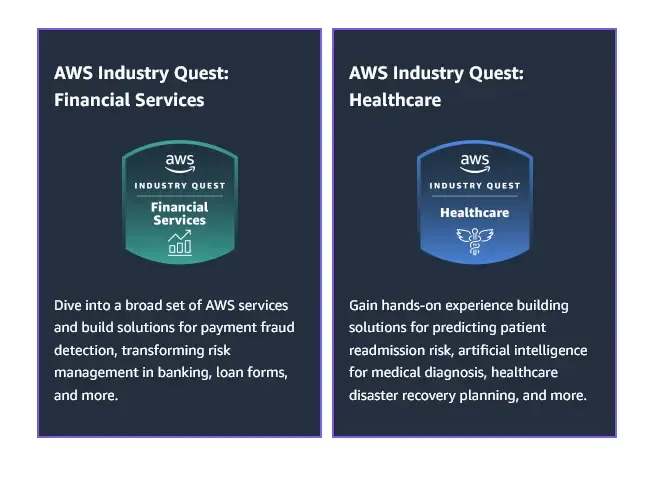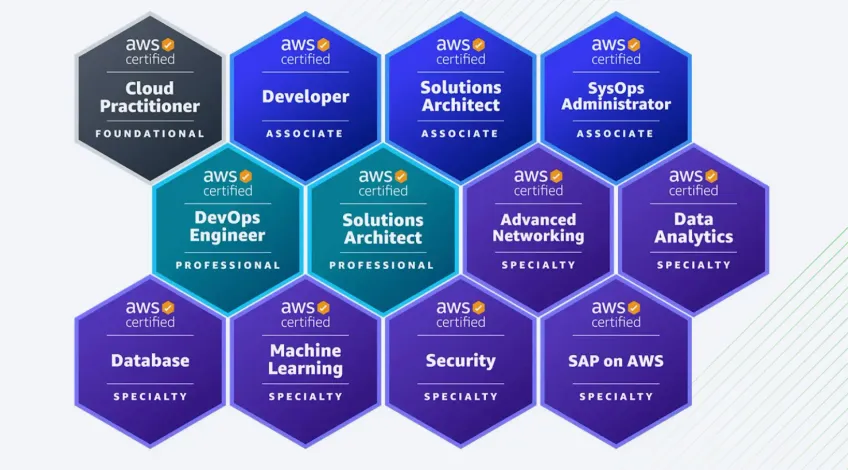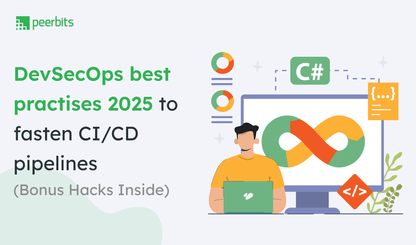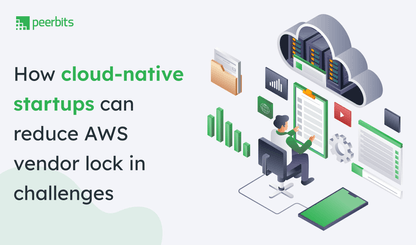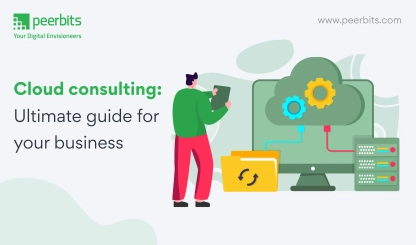Public‑cloud spending climbs fast because every business is looking to leverage its benefits. The competition in the business is because customers demand everything fast, secure, and cost-effective. This is why leadership teams are now allocating more than half of their IT budget for the cloud.
When moving to the cloud, you’d have choices. But, of them all, the AWS cloud offers several benefits — elastic capacity, rich analytics, and shorter release cycles. But still, you’ll have to manage the runaway bills, misconfigured access, and patchwork architectures that require significant expertise.
A skilled AWS consultant plugs knowledge gaps, builds guardrails, and backs choices with cost data. Therefore, picking an AWS partner starts with smart questions.
Short on time? Jump straight to the 10 key questions to ask before hiring an AWS cloud consultant, with ideal answers you can seek to better guide your decision.
Below, we’re listing 10 AWS consultant interview questions packed with details.
AWS Cloud Consultants: Roles & responsibilities
An AWS cloud consultant is an external specialist paid to plan, build, and run workloads on Amazon Web Services while steering cost, risk, and speed.
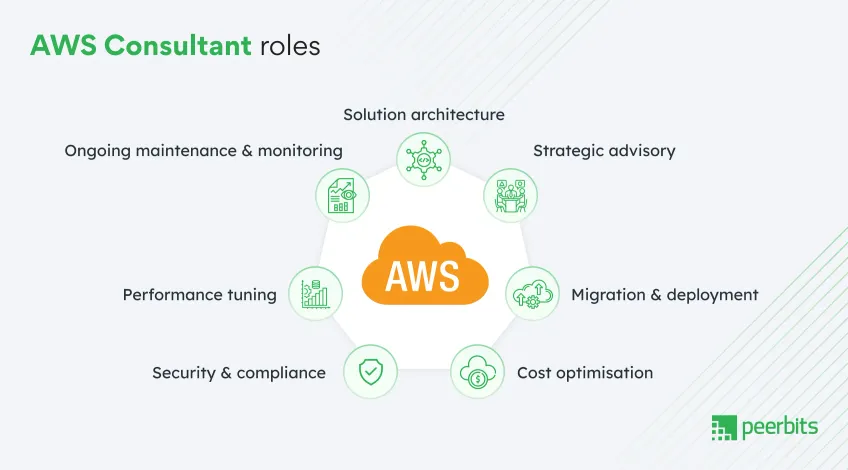
Whether you run a unicorn or need an AWS cloud consulting services for a small business, the same rule applies: hire the right AWS cloud consultant or watch bills and outages pile up.
The table below shows AWS cloud consultant roles and responsibilities.
| Duty | What it really involves | Bottom-Line Impact |
|---|---|---|
| Solution architecture | Map business needs to VPC, subnets, services, IAM. | Prevents rework and future conflicts. |
| Strategic advisory | Turn board goals (compliance, cost, growth) into cloud plans. | Ensures clear roadmap over scattered tasks. |
| Migration & deployment | Discovery, dependency mapping, replication, cut-over. | Minimizes downtime and dual hosting costs. |
| Cost optimisation | Right-size, use Graviton, Savings Plans, remove idle sandboxes. | Lowers bills without hurting performance. |
| Security & compliance | IAM policies, private subnets, KMS, logging, audits. | Helps pass audits and blocks common risks. |
| Performance tuning | Scaling, caching, read-replicas, load-balancer tweaks. | Speeds up UX, reduces support tickets. |
| Ongoing maintenance & monitoring | Patching, metrics, chaos drills, monthly reports. | Keeps systems stable and bills predictable. |
Hiring AWS cloud consultants: What to consider
If you are looking to hire AWS cloud consultants, then you’ll have to consider a few major aspects. Below, we’re listing out a few important ones that you’d take care of.
Industry-specific experience
To ensure you hire the right AWS cloud consultant, check whether they are familiar with the compliance or performance challenges in your industry.
Healthcare, fintech, retail, and media each carry unique latency, data‑sovereignty, or audit rules.
Certifications & expertise
You’ll need to check for the certifications and expertise of AWS cloud consultants.
Check if they are Certified Solutions Architect, SysOps Administrator, DevOps Engineer, or hold any speciality badges as mentioned in the image above.
Range of services
Check the scope of services that AWS cloud service providers offer. Some may only draw architectures while others handle DevOps pipelines, managed support, and 24×7 monitoring.
So, match the breadth to your internal gaps so nothing falls through the cracks.
Proven track record and references
You’ll have to check for case studies, success stories, or references from reputable clients and case studies with proven results.
Ask a couple of their former clients to reveal more about this AWS cloud consultant.
Technical tool stack proficiency
Determine if the AWS cloud consultant you want to hire is familiar with AWS services. Some of these are mentioned below.
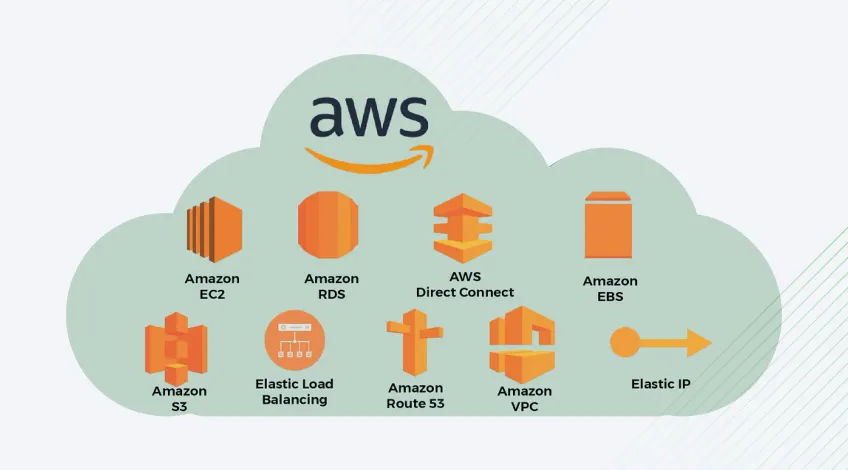
Also, you’d need to check for their expertise in third-party integration tools.
Cost-management approach
You need to ask for exact steps they’d follow to cap spend, such as automated idle‑shutdown scripts, real‑time budget alerts, savings‑plan modeling, and monthly FinOps reviews tied to business KPIs.
Ongoing support model
The AWS-certified consultant should also provide you with post-deployment support, maintenance, SLAs, and monitoring services. Define ticket priorities, response targets, and who holds the pager on holidays. A clear SLA stops finger‑pointing during incidents.
Team integration and collaboration
Make sure that the AWS expert you hire can work with your in-house developers, operations, and business stakeholders.
Read more: Everything You Need to Know About AWS Cloud Consulting
10 Key questions to ask for hiring AWS consultant
How do you hire the right AWS cloud consultant? That’s where the questions you ask can make or break the relationship.
We’ve prepared a list of the top 10 AWS consultant interview questions to reveal a consultant’s actual technical depth and execution maturity.
#1. Can you describe a recent AWS project you’ve successfully delivered, focusing on the biggest challenges?
This question sets the tone for your work with AWS cloud experts, as you’ll analyze what truly matters for your business.
What you’d want to hear?
Understand past work to gauge the reliability of future performance. It helps check whether the consultants are able to adapt, problem-solve, and implement practical AWS solutions.
- Gauge real-world experience
Make sure that the AWS cloud consultant has handled multi-region setups, cost overruns, or compliance barriers.
- Handling project complexity
Analyze how AWS cloud experts managed dependencies, stakeholders, and constraints.
- Implement their learnings
Ask what went wrong in the past and understand how they course-corrected, and what they’d do differently.
What do you want to hear?
The best AWS cloud consultant experts will answer in a structured way that shows technical clarity and accountability.
- A problem-solving approach
Look for a timeline-driven story: challenge → analysis → options → solution — reflecting a disciplined, client-centric mindset.
- Relevant AWS services used
Ask what services they used and why. Be it RDS, S3, Lambda, EC2, CloudFront, or IAM, ask if they made the choice based on performance or compliance, as the reasoning shows AWS solution architecture skills.
- Adaptability
See if they switch from EC2 to Fargate mid-project to save costs or scale faster, demonstrating their flexibility in shifting from on-prem to the cloud.
How to assess expertise?
-
Ask for diagrams, Terraform code, CloudFormation templates, or documentation on their deployment logic.
-
See if they integrated tools like Jenkins, Terraform, CloudWatch, or other AWS cloud monitoring tools.
-
Check what the solutions saved, how they improved performances, and how they reduced spending, as you tie this to AWS cost optimization .
Read more: How AWS managed service help in cloud cost optimization?
#2. How do you approach designing an AWS architecture that aligns with business-specific needs?
Answers to this question will help you test how the consultant ties technical planning to your business model.
Do they lead with documentation, or do they try to force-fit cookie-cutter solutions?
What do you want to hear?
Check for clear mention of frameworks like the AWS Well-Architected Framework, requirement discovery phases, and risk logs. Anything vague here is a red flag.
- Modular design
See if they have modern architectures that scale and evolve as you look for modularity and future-proofing in their design.
- Scalability
Ask how they handle growing data, spiky workloads, or new regions and whether they rely on Auto Scaling groups, serverless APIs, etc.
- Best practices (e.g., Well-Architected Framework)
These include cost-aware designs, minimal blast radius, operational excellence, and secure defaults. If these aren’t mentioned, they may not be building to scale.
How to assess expertise?
-
An experienced consultant outlines process steps, from discovery to build, test, monitor, and iterate.
-
Look for real examples of architectures based on security-first principles, multi-AZ designs, and documented decisions.
#3. Which AWS services and tools do you use most frequently, and why?
This question probes familiarity with the AWS ecosystem—and more importantly, how services are applied contextually to business use cases.
What you’d want to hear?
You’d need an opinionated yet informed decision based on data, cost, and future-readiness.
- Reasons for choosing services like EC2, Lambda, RDS, S3, etc.
Identify whether they use EC2 for full control, Lambda for event-driven functions, or RDS for managed SQL databases. Make sure each of these choices is backed by experience.
- Expertise in these tools and dedicated teams
Do they manage them solo or have specialists for networking, DevOps, security, etc.? Good AWS cloud consultant experts rarely work alone on complex builds.
How to assess expertise?
-
Check how their AWS processes match service choice with performance, cost, and scalability. For example, S3 Intelligent-Tiering can be used to save on cold storage, or Lambda to avoid provisioning idle EC2s.
-
Ask for sample dashboards, configurations, or even billing reports that show AWS cost optimization tied to service usage.
#4. What’s your strategy for maintaining security and compliance in AWS?
It's one of the questions that goes beyond encryption. You’d explore how an AWS cloud consultant protects your data, satisfies auditors, and enforces governance across your environment.
What you’d want to hear?
See if the conversation tends to skew towards AWS cloud consultant experts who exemplify security best practices tied to real workloads and frameworks.
- IAM best practices
Ask if they’ve used AWS IAM Access Analyzer, built identity federation, or enforced permission boundaries in multi-account environments.
- Encryption
Expect details on KMS-managed keys, customer-managed keys, and client-side encryption where necessary.
- Logging & scanning
Listen for setups using AWS CloudTrail, Config, GuardDuty, and third-party AWS cloud monitoring tools like Trend Micro or Datadog.
- Governance
Governance involves automated remediation, tagging standards, and policy enforcement using AWS Organizations and Control Tower.
How to assess expertise?
- Ask about security incidents they’ve resolved or audits they’ve passed, and whether their design mitigates risk or has faced any issues.
- Look for references to CIS Benchmarks, NIST 800-53, ISO 27001 mappings, or SOC2 readiness.
#5. How do you handle high availability and disaster recovery planning on AWS?
Check to see if this AWS cloud consultant can meet production reality. You’ll test how your consultant designs for uptime and prepares for worst-case failure.
What you’d want to hear?
Good answers should blend strategy, tooling, and operational cadence based on the following areas:
- Multi-AZ
Expect ELBs across AZs, replicated databases like RDS or Aurora, and services deployed in fault-tolerant configurations.
- Multi-region strategies
See if they mention active-passive or active-active setups with Route 53 for DNS failover, or even S3 cross-region replication.
- Backup policies
Check for frequency, retention duration, and restore tests—ideally automated with Lambda and Step Functions.
- RTO/RPO
Can they define Recovery Time Objective (RTO) and Recovery Point Objective (RPO) in practical terms for your use case?
How to assess expertise?
- Ask for previous AWS disaster recovery plans they’ve written or run, including escalation paths, test schedules, and rollback steps.
- Look for proof of quarterly DR drills, results, and follow-up improvements as a reliable AWS cloud consultant functions on testing.
#6. How do you integrate DevOps practices with AWS services?
DevOps in AWS services goes beyond building pipelines. You’ll ask this question to learn about their culture, automation, and lead time reduction so that you know your AWS consultant builds sustainable delivery workflows.
What you’d want to hear?
The strongest consultants tie tools to outcomes: faster releases, safer changes, and rollback confidence.
- AWS CodePipeline
Used for orchestrating code flows, from build to deploy, in a visual and event-driven way.
- CodeBuild & CodeDeploy
Critical for build automation and blue/green or canary-style deployments, especially in regulated or high-stakes environments.
- Infrastructure as Code (IaC)
The use of Terraform or AWS-native CloudFormation shows maturity. You can also ask whether they maintain modules, use versioning, or conduct peer reviews.
How to assess expertise?
- Ask to see how one of their AWS CI/CD pipelines works: triggers, stages, approvals, and rollback paths.
- Look for integration with Slack or Teams, pipeline visibility, and how they handle secrets management (e.g., AWS Secrets Manager).
#7. What kind of monitoring and logging strategies do you usually implement?
Ask this question to reveal how your consultant ensures observability because you don’t have to find out that something is broken from a customer complaint.
What you’d want to hear?
It’s here you want to listen for AWS-driven automation, layering, and business-focused visibility.
- CloudWatch metrics
System, app, and custom metrics. Consultants should know how to centralize and filter insights.
- Alarms
Expect details on SNS alerts, anomaly detection, and integrations with escalation tools like PagerDuty.
- Logs
Logs should be shipped to S3, retained per policy, and queried via CloudWatch Logs Insights or OpenSearch.
- AWS X-Ray
Distributed tracing via AWS X-Ray shows how requests flow and where bottlenecks form, especially for microservices or Lambda-based apps.
How to assess expertise?
- Check recent dashboard or alerting setup they built to see if it includes thresholds, custom KPIs, and cost metrics.
- Do they monitor not just CPU but also checkout rates, request failures per customer, or latency during key traffic hours?
#8. What is your experience with containerization and serverless architectures on AWS?
Ask this question to learn how your AWS cloud consultant handles modern application architectures. Check if they prioritize scalability, cost efficiency, and reduced operational overhead.
What you’d want to hear?
Listen to the architectural decisions they made regarding the use of containerization and serverless architectures.
- ECS
Ask how they handled auto-scaling and service discovery.
- EKS
Make sure they explain IAM roles for service accounts, ingress controllers, and cluster autoscalers.
- Fargate
Look for knowledge around pricing models and integration with CI/CD.
- Lambda best practices
Ask how they deal with cold starts and concurrency limits, as well as how they use tools like Step Functions for orchestration.
How to assess expertise?
- Ask for details on containerizing a legacy monolith or building serverless APIs with DynamoDB and API Gateway.
- Check if they speak to operational trade-offs, debugging pain points, and performance tuning in both models.
#9. How do you plan to handle data storage and database migrations?
The answer to this question will tell you how well the consultant protects, migrates, and optimizes critical datasets.
What you’d want to hear?
Genuine consultants will break this down into tooling, timelines, and testing in the following areas:.
- RDS
Look for experience with version upgrades, multi-AZ read replicas, and encryption.
- DynamoDB
Ask if they’ve handled global tables, TTL settings, and indexed design for high-throughput apps.
- Migration patterns
Blue/green deployments, replication-based strategies, phased cutovers—all signal maturity.
- DMS (Database Migration Service)
One of the most reliable tools. Ask how they handled schema conversion, live syncs, and rollback readiness.
How to assess expertise?
- Ask to see past project documentation for thorough migration roadmaps—timelines, roles, risk logs, fallback points.
- Do they create snapshot-based rollbacks, DNS-based cutbacks, or environment toggles in Route 53?
Read more: Top 10 Best Practices for AWS Migration You Should Know
#10. Can you walk us through a typical AWS deployment pipeline you set up for clients?
This is the final question that reveals how your AWS cloud consultant turns code into a live, monitored, and testable product. It’s where DevOps meets infrastructure maturity.
Check the following over here.
What you’d want to hear?
Expect a detailed flow from code committed to production-ready infrastructure.
- Pipeline steps
Check how they automate different steps: Code commit → lint/test → build → artifact store → deploy (with approvals or stages).
- Integration testing
You’ll discover the smoke tests, API health checks, and performance validations.
- Zero-downtime deployment
Ask if they use blue/green, canary, or feature flags. Downtime should never be acceptable in modern systems.
How to assess expertise?
- Check tooling expertise in GitHub Actions, Jenkins, GitLab CI, and AWS CodePipeline.
- Ask for access-controlled screenshots or test runs (mock data is fine). Nothing beats a demo walkthrough of their typical AWS deployment pipeline.
How to started hiring an AWS cloud consultant?
1. Define your business goals and scope
Begin with a one‑pager that mentions pain points, success metrics, compliance caps, and budget ceiling.
- List one‑sentence objectives such as faster releases, lower bills, and airtight compliance.
- Flag constraints such as go‑live date, budget ceiling, and must‑keep tools.
- Rank goals by value to keep discovery calls focused.
- Store the sheet where every stakeholder can tweak it.
2. Short‑list by experience and certifications
A few of the AWS cloud consultants may have similar titles, but their AWS cloud Consultant skills may differ. So, search Partner Finder, comb through community threads, and scan AWS cloud consultant case studies
And then, shortlist AWS cloud consultants who match the badges and domain.
- Scan AWS cloud consultant case studies for workloads like yours.
- Check the badges they might have, such as Architect Pro, DevOps Pro, and Security Specialty.
- Verify the industry in which they excel — healthcare, Fintech, retail, etc.
- Compare tool stacks that have IaC, AWS cloud monitoring tools, and CI/CD.
3. Run a discovery call or tiny pilot
Start with sharing a brief and firing the cloud consultant interview questions above. Next, watch how candidates probe deeper.
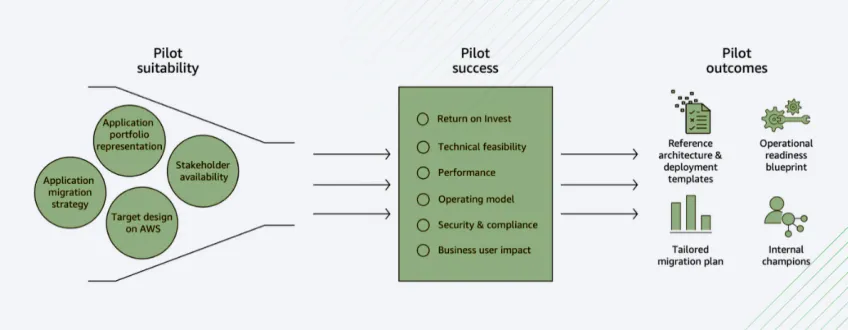
Take the following steps here:
- Bring your goal sheet and the top 10 AWS consultant interview questions.
- Ask for demo dashboards covering AWS migration consultant work, AWS DevOps integration, and an AWS disaster recovery plan.
- Cap the pilot with a retro on lessons and savings found.
- Keep notes for internal scoring.
4. Draft scope and pricing
Lock every deliverable in writing before kickoff. This way, you’d turn findings into a statement of work: milestones, deliverables, hand‑off dates, and a KPI on spend.
- Breaking work into milestones tied to payment.
- Attaching KPIs like latency cut, spend drop, and audit score.
- Detailing the rollback path for each release.
- Defining hand‑off assets like runbooks, tagged AWS deployment pipeline code.
- Adding a warranty window for post‑launch tweaks.
5. Set the communication tempo
Make sure that the AWS-certified consultant is up there to respond to you on daily Slack touchpoints during build, weekly demos for executives, and shared dashboards for health and cost.
These are one way to build transparency and avoid unnecessary hassles during work hours.
- Agree on daily stand‑ups during crunch weeks.
- Publish weekly spend and performance graphs.
- Rotate ownership of action items to grow in‑house AWS cloud consultant skills.
- Keep a shared risk log visible to execs.
- Close each quarter with fresh Cloud Consultant Interview Questions to steer improvements.
Conclusion
Don't just tick off certifications or review experiences when hiring an AWS cloud consultant. There are questions to ask, industry experience to check, and a depth of technical expertise required. Everything eventually adds up to choosing a reliable AWS consultant expert.
Asking the right questions to an AWS cloud consultant will help filter out the fluff and identify consultants who don’t just architect but deliver.


